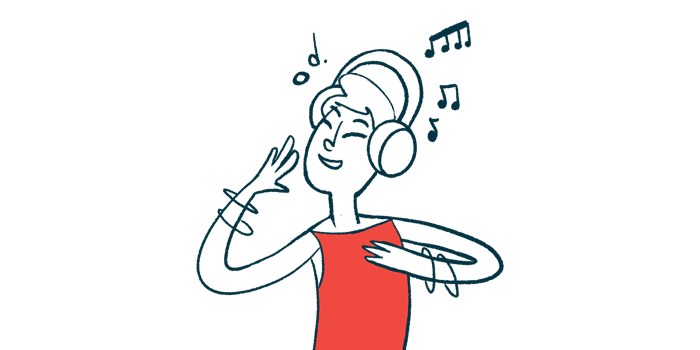Virtual music therapy benefits Parkinson’s patients and caregivers
12-week program seen to ease apathy, depression in patients

A 12-week virtual music therapy program was found to reduce apathy and depression among people with Parkinson’s disease — and to help ease feelings of burden for their caregivers, a new study reported.
“Group music therapy is an effective treatment for apathy in PD [Parkinson’s disease] and may improve mood,” the researchers wrote. Both patients and caregivers were invited to join in the weekly online music sessions.
“Subjectively, over one-third of people with PD reported increased interest in activities, and over half of the PD participants either restarted an old hobby or started a new one by the end of the study,” the team wrote, adding that “the post-intervention satisfaction survey also revealed high levels of satisfaction among caregivers.”
Additionally, the researchers highlighted the utility of the secure videoconferencing platform, noting that “the virtual format is a feasible alternative to in-person sessions with high adherence and satisfaction” among participants.
“Virtual Group Music Therapy for Apathy in Parkinson’s Disease: A Pilot Study,” was published in the Journal of Geriatric Psychiatry and Neurology.
Patients give Parkinson’s music therapy program a 9.5 of 10
Defined as a lack of motivation to one’s achieve goals, apathy is a known emotional symptom of Parkinson’s and is estimated to affect about 40% of people with the neurological disorder. Apathy has been linked to worse quality of life for patients and a poorer ability to manage day-to-day tasks.
It can be hard to manage, and there aren’t any approved therapies to ease this symptom. Apathy in patients also has been linked to a greater sense of burden among caregivers.
Data suggest that participating in music therapy might be helpful for Parkinson’s patients and caregivers struggling with apathy. To test this, a team of U.S. scientists investigated such a program’s use in a small study designed to assess patient motivation.
Music therapy involves making and/or listening to music under the supervision of a trained therapist. This program consisted of hour-long sessions, held once weekly for 12 weeks, or about three months. Each session included five to six pairs of patients and caregivers. A session would start with a check-in, followed by vocalization exercises, drumming, and therapeutic group singing, then conclude with another check-in and a few minutes of deep breathing.
A total of 16 people with Parkinson’s and their caregivers enrolled in the study. Most of the patients were men and most caregivers were women — almost all participants were husband-wife pairs. All of the participants were white individuals.
A kit including several musical instruments was given to everyone participating in the study.
All of the Parkinson’s patients had notable apathy upon entering the trial. Half of them had depression, and about a third had anxiety.
At the start and end of the program, patients and caregivers completed a battery of standardized tests assessing their emotional wellbeing and quality of life.
The results showed that, at the end of the 12 weeks, there was a large and statistically significant decrease in apathy scores. Depression scores also decreased significantly.
Overall life quality scores tended to improve slightly after the program, but the change was not statistically significant — meaning there’s a sizable mathematical probability the difference is due to random chance. The researchers noted that this study may have been too small to detect a statistically meaningful improvement.
When asked to rate their satisfaction with the music therapy program on a scale from 1 to 10, with higher numbers indicating greater satisfaction, most patients gave a rating of 9.5 or higher. Many patients reported subjectively feeling that the program had improved their mood and voice quality.
Separate music therapy sessions suggested for Parkinson’s patients, caregivers
Data analyses from the 16 caregivers showed no significant effect on measures of caregiver burden. However, the researchers noted that two of these caregivers had only attended about half of the sessions. Analyses of the remaining 14 caregivers who went to the majority of sessions showed a statistically significant reduction in caregiver burden scores.
Caregivers and people with [Parkinson’s] may need to participate in separate music therapy sessions so that goals of treatment are appropriately addressed and to allow caregivers to focus on themselves.
Most caregivers rated their satisfaction with the program as 9 of 10 or higher, and many reported that the program had inspired them to incorporate more music into their daily lives. However, many caregivers also reported feeling the program was more helpful for their loved one with Parkinson’s disease than for the caregiver. This suggests having combined music therapy for both patients and caregivers might not be optimal.
“Caregivers and people with [Parkinson’s] may need to participate in separate music therapy sessions so that goals of treatment are appropriately addressed and to allow caregivers to focus on themselves,” the researchers wrote.
Several participants — both patients and caregivers — also reported that they did not like the music used in the program, which was determined based on decisions in each session group. Person-to-person variation in music tastes “remains a challenging aspect of providing music therapy in a group setting,” the researchers said.
The team stressed that this was a small pilot study, so further research is needed to evaluate how music therapy might be used to optimally help patients. Still, they said this study suggests this type of treatment is worth exploring.
“Given the effectiveness of non-pharmacologic treatments and strong patient interest in these interventions, further research on the clinical uses of music and other complementary therapies in Parkinson’s disease is warranted,” the scientists concluded.








